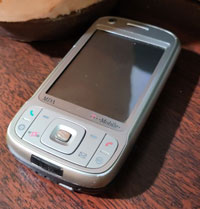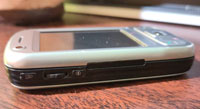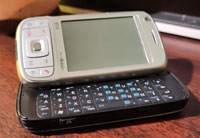


When I got my first smartphone, it felt revolutionary.
Games with a proper little D-pad! Email my friends from wherever!

A wee scroll wheel, for scrolling through websites! On the internet! The whole internet which now lives in my pocket!

Damn, with all those buttons I bet I could play some sweet games on this thing!
And then the iphone came out, and buggered things up.
Almost instantly the scroll wheel on phones disappeared, in favour of carving a fresh channel through your own finger grease every few seconds. Within a few years it was hard to find a phone with a keyboard. Soon after that, even the buttons on the front were gone, and now every phone is the same - just a black glass slab. Copy the iphone but cheaper, never mind that if people want an iphone they'll buy an iphone, just do the black glass slab. Phone reviewers desperately spill thousands of words describing the edges and corners of these black glass slabs (they're as comfortable to hold as the case you put it in) or praising their thinness (they're as thin as the case you put them in) until they finally crack and are found running naked down the high street screaming "BLACK SLAB GLASS SLAB BLASS BLAG BLACK SLAB"
Were you excited to buy your most recent phone? Or did you spend several worried days anxiously furtling around identical review sites reviewing identical phones and trying to figure out which one would put up the feeblest fight when you wanted to change the battery or stop it spying on you, while simultaneously constructing a little jig out of random shit on your nightstand to hold the wire at just the right angle that would still coax a few electrons through your knackered-out charging hole?
The smartphone promised pocket gaming, communication and productivity, and those promises were broken by increasingly exploitative software and the phone industry's determination to settle on the capacitive touchscreen, an input method that was the cheapest possible option while being just about good enough to sort-of work most of the time. When you're lucky enough to find a game that's playable on a touchscreen, you're constantly hounded - for money, for attention, for interaction with some other program. When you're done with the game, enjoy some nice scrolling through an endless feed of algorithmically-chosen shit designed to press your emotional buttons just enough to prevent you from leaving.
You pay for it once. The company that made this thing included their profit margin when they set the price - they don't need to stuff it full of spyware to make their money back.
It does one thing well: play games, using a joystick or D-pad and buttons. Every millimetre of it is designed for this one thing.
It doesn't pop up a notification to distract you from what you're doing with some nag for attention. When you're playing the game, you're playing the game, because that's what this is for.
When you're done playing the game - and remember, these games come from a time before the ad-supported free-to-play business model, so you can be done - you turn it off. I don't mean blank the screen, I mean turn the damn thing all the way off, and it becomes an inert lump in your pocket, no radio waiting for a prompt to beep at you, no microphone waiting to hear something that Mark Zuckerberg might find interesting, it's off.
It doesn't get slower over time. Why would it? It plays SNES games for goodness' sake, the SNES is still the SNES, the games have been the same for thirty years, there are no more updates, nothing to eat up your memory and CPU cycles. You buy one Game Dad and that's it, you're done, at least until the PS2-capable ones drop below a couple hundred bucks.
While a phone manufacturer will say "What's that, you want to root this thing so you can delete Facebook? Lol no, Facebook paid us to put that on there," a Game Dad manufacturer will say "Oh, you wanna change the operating system? Good, ours is shit anyway, just pop it in the top SD slot and we'll boot to whatever's on there whether it works or not. You bought the damn thing, we've got your money either way."
Because smartphones are pretty much compulsory, the manufacturers can give up on innovation (or innovate in areas that make the phones worse) and you'll be forced to buy a new one anyway - Game Dads are by their very nature frivolous little things that you don't need at all, so the manufacturers still have to compete and innovate and entice. If you already have a Game Dad and it works just fine, the manufacturers are gonna have to do something really amazing to make you want to buy another one.
When we're talking about emulating old consoles, CPU horsepower makes a difference in big chunky jumps. You can smoothly emulate a SNES with very little, a PlayStation with a lot more, and a PS2 with a whole lot more. While in a computer or a phone there might be a benefit in doing small incremental updates to run your games on higher graphics settings, in a Game Dad there's little point bringing out something that can't quite manage a PS1 but can emulate a SNES better, because there's really no "better" to have. So, while waiting for the next big leap, these manufacturers have to distinguish themselves from each other somehow - they're now competing to see who can make the machine that best fits in your pocket and your hands and your bank account and your life. There are Game Dads that you grip from the bottom and ones that you grip from the sides and ones with six-button layouts on the front and ones that fold in half and ones that are so tiny they can go on a keyring or fit in that little pocket in your jeans that nothing else fits in.
The Game Dad is a machine that tries its absolute hardest to be fun to play games on. If it's this or sliding your fingers around on glass, the Game Dad wins every time.